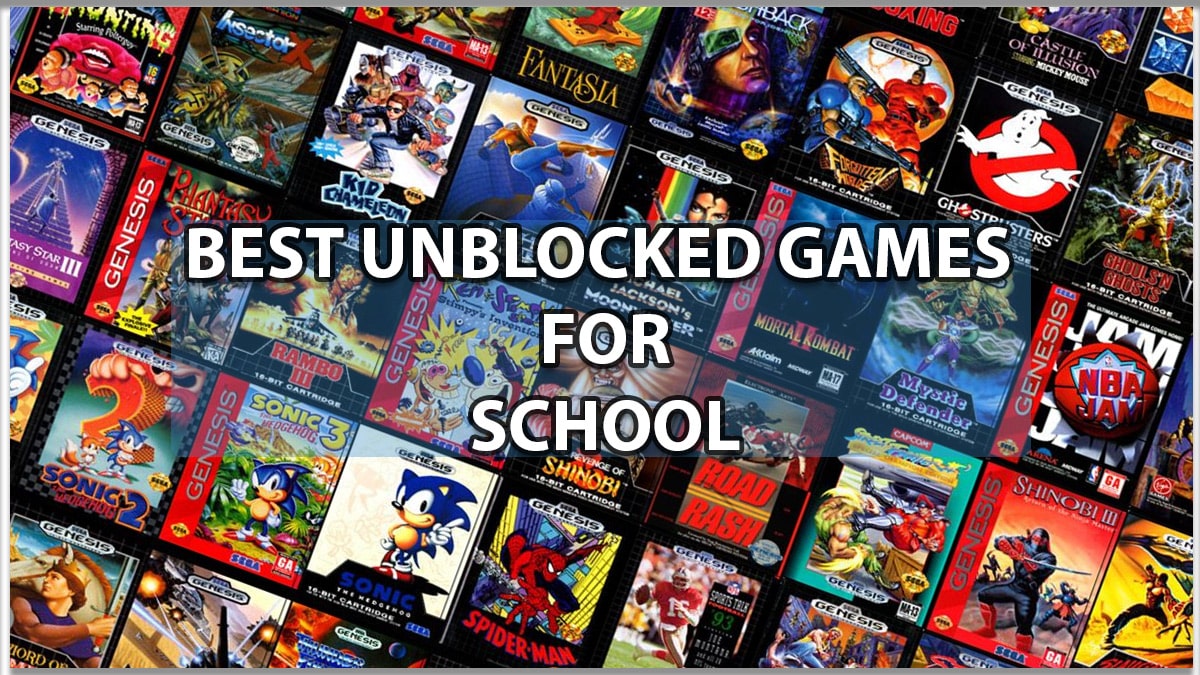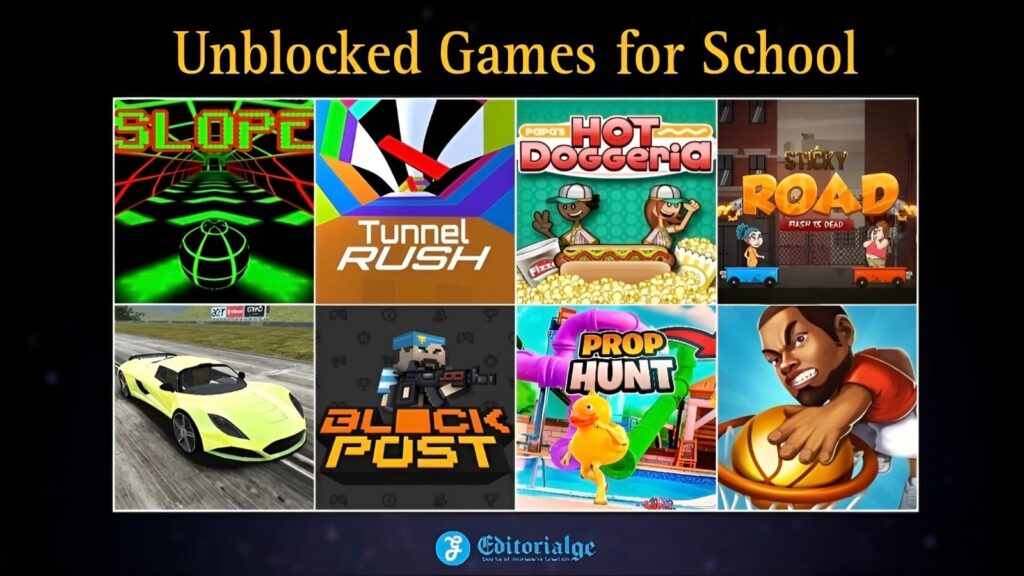Safe Unblocked Games Guide For School Fun & More!
Are unblocked games the secret weapon for surviving the school day? The allure of readily available, easily accessible games at school is undeniable, offering a quick escape from the rigors of academics and a chance to unwind with a bit of digital entertainment. But is this seemingly harmless pursuit truly as simple as a few clicks, or are there deeper considerations to ponder?
The phrase "unblocked games g guide safe fun gaming at school more" encapsulates a complex issue. It speaks to a desire for accessible entertainment, a need for guidance, and the inherent tension between fun and safety within the confines of an educational environment. The "g guide" aspect implies a need for navigation through the murky waters of online gaming, while the "safe" descriptor highlights the paramount importance of protecting students from inappropriate content and potential risks. The ultimate goal is "fun gaming at school," a pursuit that, while potentially enriching, must be approached with prudence and a thorough understanding of the landscape.
Let's delve into the reality of "unblocked games" at school and explore the various facets of this digital playground.
- Bam Bam Bigelow Net Worth How Much Did The Wrestler Earn
- Paul Gosars Net Worth Salary Age Investments 2024
The very term "unblocked games" suggests a workaround, a bypass of established protocols and restrictions. Schools, understandably, employ content filtering systems designed to protect students from accessing inappropriate or distracting websites. These systems often block gaming sites, social media platforms, and other potentially problematic content. However, the desire for entertainment, coupled with the technical savvy of today's youth, has led to the proliferation of websites offering games that circumvent these restrictions. These websites often utilize alternative domains, proxy servers, or other methods to bypass the filtering systems, providing students with access to a vast library of games.
The appeal of these games is multifaceted. For many students, it's a way to relieve stress, boredom, or anxiety. The fast-paced action, challenging puzzles, or simple click-and-play mechanics can be a welcome distraction from the demands of schoolwork. For others, it's a social activity. Playing games with friends, sharing high scores, or engaging in collaborative gameplay can foster a sense of community and belonging. Furthermore, these games can tap into our innate desire for competition and achievement. The opportunity to win, progress, and master new skills can be incredibly motivating.
However, the world of unblocked games is not without its perils. The primary concern is safety. Many of these websites are poorly regulated and may contain inappropriate content, including graphic violence, sexually suggestive material, or hate speech. Exposure to such content can be detrimental to a student's emotional and psychological well-being. Furthermore, the security of these websites is often questionable. They may contain malware, viruses, or other malicious software that can compromise a student's device and personal information. The anonymity afforded by some of these platforms can also create an environment where cyberbullying, harassment, and other forms of online abuse can flourish.
- Channing Crowders Net Worth Career 2024 Update Beyond
- Kyle Idlemans Salary Net Worth 20242025 Insights
Beyond safety concerns, there are also academic implications to consider. Excessive gaming can be incredibly time-consuming and may lead to a decline in academic performance. Students may spend less time studying, completing assignments, or participating in class, choosing instead to play games during school hours or after school. This can result in lower grades, missed deadlines, and a diminished understanding of key concepts. Moreover, the addictive nature of some games can further exacerbate these issues. The dopamine rush associated with winning or leveling up can be incredibly powerful, making it difficult for students to disengage and focus on their studies.
Another crucial consideration is the potential for distraction. Even if the games themselves are safe and age-appropriate, they can still divert attention from the task at hand. The constant notifications, enticing graphics, and inherent interactivity of these games can make it difficult for students to concentrate on lessons, complete assignments, or participate in class discussions. This can lead to a decline in overall academic engagement and a less enriching educational experience.
So, how can schools and students navigate this complex landscape? The answer lies in a multifaceted approach that prioritizes education, communication, and responsible online behavior. Schools can play a crucial role by establishing clear policies regarding internet usage and gaming. These policies should explicitly state which websites and games are permitted, the consequences of violating these rules, and the resources available to students who need help. Furthermore, schools can actively educate students about online safety, responsible gaming, and the potential risks associated with unblocked games. This can be achieved through classroom discussions, guest speakers, and educational materials. The focus should be on empowering students to make informed decisions and to develop critical thinking skills that will help them navigate the online world safely and responsibly.
Parents also have a vital role to play. They should be aware of their children's online activities and engage in open and honest conversations about the games they are playing, the websites they are visiting, and the potential risks they may encounter. Parents can also set time limits for gaming, monitor their children's online activity, and use parental control software to block inappropriate content. Furthermore, parents should encourage their children to pursue a healthy balance between academics, extracurricular activities, and recreational gaming. This can help prevent excessive gaming and ensure that students are developing a well-rounded skillset.
Students themselves have the primary responsibility for making informed decisions about their online activities. They should be aware of the potential risks associated with unblocked games and prioritize their safety and well-being. Students should only access websites and games that are deemed safe and appropriate, and they should report any inappropriate content or suspicious behavior to a trusted adult. They should also be mindful of the amount of time they spend gaming and prioritize their academic responsibilities. Ultimately, students need to cultivate a sense of self-discipline and responsibility when it comes to online gaming.
In conclusion, the issue of unblocked games at school is not a simple one. It is a complex interplay of desire, risk, and opportunity. While the lure of easily accessible entertainment is undeniable, the potential dangers are equally significant. By prioritizing safety, education, and responsible online behavior, schools, parents, and students can work together to create a safer and more enriching digital environment. The goal is not necessarily to eliminate all gaming, but to cultivate a culture of awareness, responsibility, and informed decision-making. The "g guide" element of the "unblocked games g guide safe fun gaming at school more" phrase isn't just about finding games; it's about navigating the digital world responsibly, ensuring that the pursuit of "fun gaming at school" does not come at the expense of a student's safety, well-being, or academic success.
Instead of focusing solely on blocking or restricting access, schools and parents should consider implementing a more nuanced approach. This could include:
- Educational Initiatives: Incorporating lessons on online safety, cyberbullying, and responsible gaming into the curriculum. This empowers students to make informed decisions.
- Open Communication: Creating a safe space for students to discuss their online experiences, fostering dialogue between parents, educators, and students.
- Age-Appropriate Content: Encouraging the use of age-appropriate games and platforms that align with school policies and promote safe online practices.
- Technical Solutions: Employing robust content filtering systems that can be updated regularly to address evolving threats.
Furthermore, schools can explore alternative ways to incorporate gaming into the educational experience. Educational games, which are specifically designed to teach and reinforce academic concepts, can be a valuable tool for engaging students and enhancing their learning. Esports programs, which involve competitive gaming in a structured and supervised environment, can foster teamwork, strategic thinking, and other valuable skills. These alternatives provide a way to enjoy the benefits of gaming without the inherent risks associated with unblocked games.
Ultimately, the key lies in finding a balance. It is a delicate balance between allowing students to explore the digital world and ensuring their safety, between the desire for fun and the importance of academic achievement. The path to "safe fun gaming at school" is not a simple one, but it is a journey worth undertaking. By working together, schools, parents, and students can create a digital landscape that is both engaging and secure, fostering a positive and enriching learning environment.
The conversation around "unblocked games g guide safe fun gaming at school more" should not be seen as a negative one, but one that seeks to improve and guide, making sure the digital experiences of our students support their growth and safety, and encourage them to have fun.

Top Unblocked Games For School & Work 2025 Edition

Unblocked Games 6X The Ultimate Guide to Safe and Fun Online Gaming

Get Ready for an Amazing Experience with Unblocked Games for School